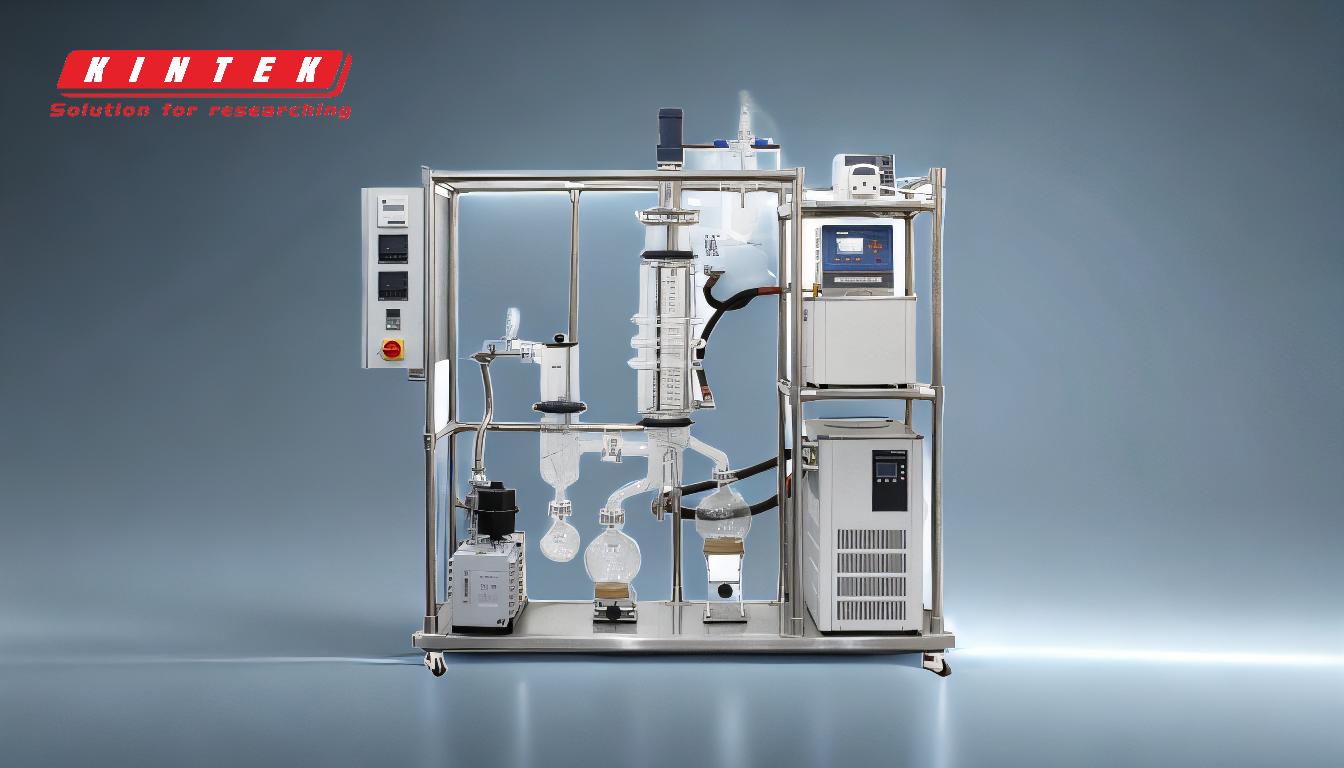Vacuum distillation, while a highly effective technique for separating and purifying compounds, carries several inherent risks that must be carefully managed to ensure safety. These risks primarily stem from the use of flawed glassware, the concentration of unstable impurities, and the potential for mechanical or thermal hazards. Understanding these risks and implementing proper precautions can mitigate the likelihood of accidents such as implosions, explosions, and injuries.
Key Points Explained:

-
Implosions Due to Flawed Glassware:
- Cause: Glassware used in vacuum distillation, such as rotary evaporators or short-path distillation equipment, is subjected to significant pressure differentials. Flaws like star-cracks or weak points in the glass can lead to sudden implosions.
- Risk: Implosions can cause shards of glass to scatter, leading to injuries and contamination of the workspace.
- Prevention: Regularly inspect glassware for defects, avoid using damaged equipment, and ensure proper handling to prevent impact damage.
-
Explosions from Concentrating Unstable Impurities:
- Cause: During the evaporation process, unstable compounds such as organic azides, acetylides, nitro-containing compounds, or molecules with strain energy can concentrate. These compounds may become explosive when taken to dryness.
- Risk: Explosions can result in severe injuries, damage to equipment, and release of hazardous materials.
- Prevention: Avoid concentrating unstable impurities by carefully selecting solvents and compounds, and never take unstable compounds to complete dryness. Use appropriate safety protocols and equipment.
-
Mechanical Hazards from Rotating Parts:
- Cause: Rotary evaporators and similar equipment have rotating parts that can entangle loose hair, clothing, or jewelry.
- Risk: Entanglement can lead to burns, cuts, or other injuries, especially if the equipment is operating at high temperatures.
- Prevention: Ensure that all loose items are secured, and avoid wearing jewelry or loose clothing when operating the equipment. Maintain a safe distance from rotating parts.
-
Thermal Hazards from High-Temperature Fluids:
- Cause: High-temperature fluids like Syltherm are used in some distillation setups. Leaks or improper handling can result in burns or equipment damage.
- Risk: Contact with high-temperature fluids can cause severe burns, and leaks can damage surrounding equipment.
- Prevention: Use heat-resistant materials (e.g., viton, PTFE, or PFA) for tubing and connections. Avoid silicone tubing, which is unsuitable for high temperatures. Regularly check for leaks and ensure proper sealing.
-
Cooling System Failures:
- Cause: Inadequate cooling water flow or insufficient levels of cooling agents (e.g., ethanol, liquid nitrogen) can lead to overheating and equipment failure.
- Risk: Overheating can cause the distillation process to fail, potentially leading to the release of hazardous materials or damage to the apparatus.
- Prevention: Regularly check and maintain cooling systems, ensuring that cooling water valves are open and functioning correctly. Verify that cooling agents are at appropriate levels.
-
Improper Sealing and Leaks:
- Cause: Inadequate sealing of connections in the distillation apparatus can lead to leaks, which may result in loss of vacuum, contamination, or exposure to hazardous materials.
- Risk: Leaks can compromise the efficiency of the distillation process and pose safety hazards, especially if toxic or flammable substances are involved.
- Prevention: Ensure all connections are properly sealed and regularly inspect the apparatus for leaks. Use appropriate gaskets and seals compatible with the materials being distilled.
-
Impact Damage to Glassware:
- Cause: Rough handling or accidental impacts (e.g., from hard objects like watches or rings) can damage glassware, increasing the risk of implosions or leaks.
- Risk: Damaged glassware is more likely to fail under vacuum, leading to potential injuries or contamination.
- Prevention: Handle glassware with care, avoid wearing hard objects during operation, and store equipment securely to prevent accidental impacts.
By understanding these risks and implementing the appropriate precautions, users can significantly reduce the likelihood of accidents during vacuum distillation. Regular maintenance, proper handling, and adherence to safety protocols are essential to ensure a safe and effective distillation process.
Summary Table:
| Risk | Cause | Prevention |
|---|---|---|
| Implosions | Flawed glassware under vacuum pressure | Inspect glassware regularly, avoid using damaged equipment, handle with care |
| Explosions | Concentration of unstable impurities during evaporation | Avoid concentrating unstable compounds, use proper safety protocols |
| Mechanical Hazards | Rotating parts entangling loose items | Secure loose clothing, avoid jewelry, maintain a safe distance |
| Thermal Hazards | High-temperature fluid leaks | Use heat-resistant materials, check for leaks regularly |
| Cooling System Failures | Inadequate cooling water flow or insufficient cooling agents | Maintain cooling systems, ensure proper levels of cooling agents |
| Improper Sealing and Leaks | Inadequate sealing of connections | Ensure proper sealing, inspect for leaks, use compatible gaskets |
| Impact Damage to Glassware | Rough handling or accidental impacts | Handle glassware carefully, avoid wearing hard objects, store securely |
Ensure your vacuum distillation process is safe and efficient—contact our experts today for personalized guidance!











